Meeting the Challenge of Reducing Enteric CH4 Emissions from Sub-Saharan Africa
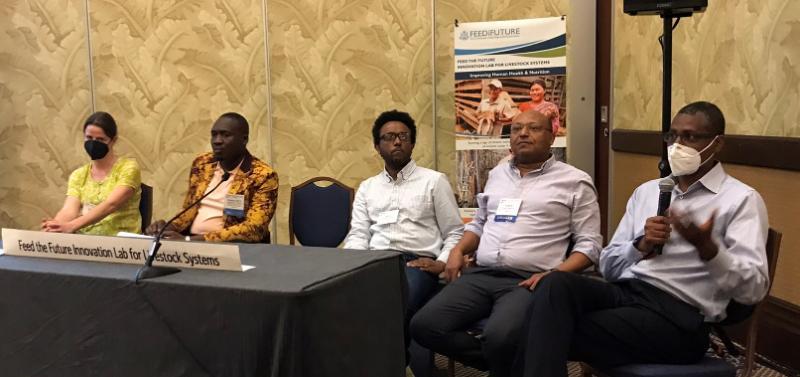
This workshop was held June 5, 2022 as part of the international Greenhouse Gas & Animal Agriculture (GGAA) 2022 Conference in Orlando, Florida. It was presented by the Feed the Future Innovation Lab for Livestock Systems, and we are pleased to share the videos and presentations here.
Videos
These video recordings are provided by the University of Florida's Institute of Food and Agricultural Sciences (IFAS).
- Part 1: https://ifasgallery.ifas.ufl.edu/oci/ggaa/2022/presentations/Palm-A-June-5-1.mp4
- Gbola Adesogan begins at 04:17
- Ermias Kebreab begins at 16:40
- Hayden Montgomery beings at 55:35
- Mulubrhan Balehegn Gebremikael begins at 1:17:38
- Part 2: https://ifasgallery.ifas.ufl.edu/oci/ggaa/2022/presentations/Palm-A-June-5-2.mp4
- Enyew Negussie begins at 00:40
- Claudia Arndt begins at 40:38
- Oualyou W. S. Ouermi begins at 1:06:29
- Panel discussion begins at 1:28:38
Presentations
Click on the presentation title to download a PDF file.
- Advances in technologies for reducing enteric methane emission from livestock, by Ermias Kebreab
- Methane Hub and Global Research Alliance on Agricultural Greenhouse Gases (The role of GRA in accelerating GHG mitigation, capacity building and leveraging co-benefits), by Hayden Montgomery
- Climate smart approaches for reducing GHG emission from small holder livestock sectors in Africa, by Mulubrhan Balehegn
- The journey less travelled: Methane measurement on a large scale & its mitigation in smallholder livestock production systems, by Eneyew Nigussie
- Activities & research at the Mazingira Centre at ILRI in Kenya, by Claudia Arndt
- Estimating methane emissions from Djallonke Sheep using GreenFeed in Burkina Faso, by Ouermi Oualyou

More details about the workshop are available from this flyer:
Meeting the Challenge of Reducing Enteric CH4 Emissions from Sub-Saharan Africa (workshop flyer and agenda)
Speakers
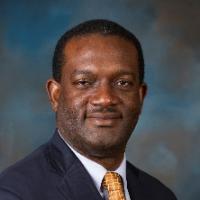 Adegbola (Gbola) Adesogan is the Director of the Feed the Future Innovation Lab for Livestock Systems and a Professor of Ruminant Nutrition at the University of Florida. His research interests include using animal-source foods to improve human health and nutrition, improving food and feed safety, quality, and preservation, as well as devising sustainable strategies to optimize the performance, health and welfare of livestock. Prior to his tenure at the University of Florida, he was an Assistant Professor of Animal Nutrition at the University of Wales, UK. He has served on the editorial boards of various animal science journals, mentored many PhD and masters’ students, and authored or coauthored more than 200 scientific publications. He has earned many honors, including awards from the American Dairy Science Association, the Faculty Commons, and the Florida Agricultural Experiment Station. In 2018, he was named International Educator of the Year by the University of Florida’s College of Agricultural and Life Sciences.
Adegbola (Gbola) Adesogan is the Director of the Feed the Future Innovation Lab for Livestock Systems and a Professor of Ruminant Nutrition at the University of Florida. His research interests include using animal-source foods to improve human health and nutrition, improving food and feed safety, quality, and preservation, as well as devising sustainable strategies to optimize the performance, health and welfare of livestock. Prior to his tenure at the University of Florida, he was an Assistant Professor of Animal Nutrition at the University of Wales, UK. He has served on the editorial boards of various animal science journals, mentored many PhD and masters’ students, and authored or coauthored more than 200 scientific publications. He has earned many honors, including awards from the American Dairy Science Association, the Faculty Commons, and the Florida Agricultural Experiment Station. In 2018, he was named International Educator of the Year by the University of Florida’s College of Agricultural and Life Sciences.
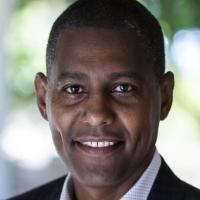 Ermias Kebreab is Associate Dean and holds the Sesnon Endowed Chair in Sustainable Animal Agriculture at UC Davis. Dr. Kebreab conducts research in nutrition modeling of biological systems and conducts experiments to reduce the impact of animal agriculture on the environment, including the sustainable use of feed additives. He is contributing author to 2019 IPCC update and chairs feed additive committee of Food and Agriculture Organization. He has authored over 200 peer-reviewed articles. Dr. Kebreab has received several awards, including the AFIA Ruminant Nutrition Award. Dr. Kebreab received BSc from University of Asmara, Eritrea, and MSc and PhD from University of Reading, UK.
Ermias Kebreab is Associate Dean and holds the Sesnon Endowed Chair in Sustainable Animal Agriculture at UC Davis. Dr. Kebreab conducts research in nutrition modeling of biological systems and conducts experiments to reduce the impact of animal agriculture on the environment, including the sustainable use of feed additives. He is contributing author to 2019 IPCC update and chairs feed additive committee of Food and Agriculture Organization. He has authored over 200 peer-reviewed articles. Dr. Kebreab has received several awards, including the AFIA Ruminant Nutrition Award. Dr. Kebreab received BSc from University of Asmara, Eritrea, and MSc and PhD from University of Reading, UK.
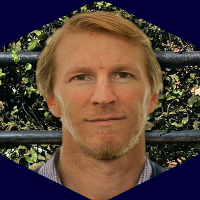 Hayden Montgomery was recently appointed as the Agriculture Program Director of the Global Methane Hub and has been the Special Representative of the Global Research Alliance on Agricultural Greenhouse Gases since 2016, representing its 66 member countries in all international fora and facilitating mitigation research between its members and partner organizations. From 2013 to 2016, he was New Zealand’s Ambassador to Argentina, Paraguay, and Uruguay. Prior to these appointments Hayden gained considerable experience within the United Nation’s climate change process, representing New Zealand in agriculture, land use and forestry negotiations between 2006 and 2012. During 2010-2012, he was based in the New Zealand Embassy in Paris where he represented New Zealand in other relevant processes and organizations including the OECD, UNEP and FAO, and spearheaded New Zealand’s international research cooperation on agricultural greenhouse gases. Mr. Hayden was involved in the development of New Zealand’s domestic agricultural climate change policy. He is based in Montevideo, Uruguay.
Hayden Montgomery was recently appointed as the Agriculture Program Director of the Global Methane Hub and has been the Special Representative of the Global Research Alliance on Agricultural Greenhouse Gases since 2016, representing its 66 member countries in all international fora and facilitating mitigation research between its members and partner organizations. From 2013 to 2016, he was New Zealand’s Ambassador to Argentina, Paraguay, and Uruguay. Prior to these appointments Hayden gained considerable experience within the United Nation’s climate change process, representing New Zealand in agriculture, land use and forestry negotiations between 2006 and 2012. During 2010-2012, he was based in the New Zealand Embassy in Paris where he represented New Zealand in other relevant processes and organizations including the OECD, UNEP and FAO, and spearheaded New Zealand’s international research cooperation on agricultural greenhouse gases. Mr. Hayden was involved in the development of New Zealand’s domestic agricultural climate change policy. He is based in Montevideo, Uruguay.
-200x200.jpg) Mulubrhan Balehegn Gebremikael is an Associate Professor of livestock production and pastoralist development at Mekelle University, Ethiopia. He holds a PhD degree in Animal Nutrition from the Norwegian Institute of Life Sciences and an MSc in Livestock Production and Pastoralist Development from Mekelle University. His research interests include improving the quality and productivity of animal feeds towards improving the productivity and consumption of animal source foods in developing countries. He is currently working as a research coordinator for a Bill & Melinda Gates Foundation-funded project at the University of Florida. Before his current position, Dr. Mulubrhan has worked as a postdoc fellow at the United Nations International Ecosystem Management Partnership (UNEP-IEMP) and at the Research and Publication Office, Mekelle University.
Mulubrhan Balehegn Gebremikael is an Associate Professor of livestock production and pastoralist development at Mekelle University, Ethiopia. He holds a PhD degree in Animal Nutrition from the Norwegian Institute of Life Sciences and an MSc in Livestock Production and Pastoralist Development from Mekelle University. His research interests include improving the quality and productivity of animal feeds towards improving the productivity and consumption of animal source foods in developing countries. He is currently working as a research coordinator for a Bill & Melinda Gates Foundation-funded project at the University of Florida. Before his current position, Dr. Mulubrhan has worked as a postdoc fellow at the United Nations International Ecosystem Management Partnership (UNEP-IEMP) and at the Research and Publication Office, Mekelle University.
-200x200.png) Enyew Negussie is livestock geneticist and Senior Scientist at the Natural Resources Institute Finland (Luke). He has over 25 years' experience in livestock breeding and genetics research. He has led and participated in several national and international livestock genetic and development research projects. His research focuses on genetics of udder health traits, genetics of dairy cattle feed efficiency, environmental impact traits, and international animal genetic and genomic evaluations, with special emphasis on across-country animal genetic evaluations. During the last 12 years, Dr Negussie has also been involved in research towards understanding the genetic and nutritional bases of methane emissions in dairy cattle and developing tools for its mitigation and methods for its measurement and monitoring. He has led long-term research collaborations between Africa and Europe, and he is currently a key partner in the African Dairy Genetic Gain (ADGG) program led by ILRI. Since 2009 he has also been lecturing on livestock breeding and management in developing countries at the University of Helsinki, Finland. Dr. Negussie has supervised several MSc and PhD students and evaluated several PhD theses for different universities.
Enyew Negussie is livestock geneticist and Senior Scientist at the Natural Resources Institute Finland (Luke). He has over 25 years' experience in livestock breeding and genetics research. He has led and participated in several national and international livestock genetic and development research projects. His research focuses on genetics of udder health traits, genetics of dairy cattle feed efficiency, environmental impact traits, and international animal genetic and genomic evaluations, with special emphasis on across-country animal genetic evaluations. During the last 12 years, Dr Negussie has also been involved in research towards understanding the genetic and nutritional bases of methane emissions in dairy cattle and developing tools for its mitigation and methods for its measurement and monitoring. He has led long-term research collaborations between Africa and Europe, and he is currently a key partner in the African Dairy Genetic Gain (ADGG) program led by ILRI. Since 2009 he has also been lecturing on livestock breeding and management in developing countries at the University of Helsinki, Finland. Dr. Negussie has supervised several MSc and PhD students and evaluated several PhD theses for different universities.
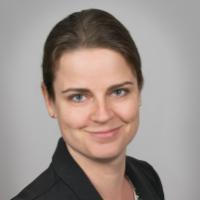 Claudia Arndt joined the Sustainable Livestock Systems Program as Senior Scientist and Co-leader of the Mazingira Centre in March 2021 and became Leader of the Mazigira Centre in May 2022. Previously, she has been working as Associate Scientist on sustainable livestock systems at the National Agrarian University La Molina in Peru. Prior to that she worked at the Tropical Agricultural Research and Higher Education Center (Spanish acronym CATIE) in Costa Rica. She was the on-the-ground coordinator of an international project called "Sustainable futures for the Costa Rica dairy sector: Optimizing environmental and economic outcomes” (SusCoRiDa) led by Bangor University in collaboration with Rothamsted Research. Before that she worked at the Environmental Defense Fund, a nonprofit environmental advocacy group in the US. Her research focuses on optimizing nutrient utilization efficiency to reduce the use of natural resources and environmental impact from livestock systems. She holds a PhD in Dairy Science from the University of Wisconsin - Madison (USA) and a MSc in Livestock Sciences as well as a BSc in Agricultural Sciences and Environmental Management from the Justus Liebig University of Giessen, Germany.
Claudia Arndt joined the Sustainable Livestock Systems Program as Senior Scientist and Co-leader of the Mazingira Centre in March 2021 and became Leader of the Mazigira Centre in May 2022. Previously, she has been working as Associate Scientist on sustainable livestock systems at the National Agrarian University La Molina in Peru. Prior to that she worked at the Tropical Agricultural Research and Higher Education Center (Spanish acronym CATIE) in Costa Rica. She was the on-the-ground coordinator of an international project called "Sustainable futures for the Costa Rica dairy sector: Optimizing environmental and economic outcomes” (SusCoRiDa) led by Bangor University in collaboration with Rothamsted Research. Before that she worked at the Environmental Defense Fund, a nonprofit environmental advocacy group in the US. Her research focuses on optimizing nutrient utilization efficiency to reduce the use of natural resources and environmental impact from livestock systems. She holds a PhD in Dairy Science from the University of Wisconsin - Madison (USA) and a MSc in Livestock Sciences as well as a BSc in Agricultural Sciences and Environmental Management from the Justus Liebig University of Giessen, Germany.
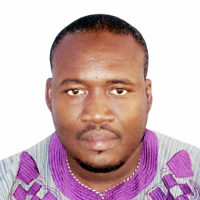 Oualyou W. S. Ouermi is a research engineer in animal production systems at Institut de l'Environnement et de Recherches Agricoles, Burkina-Faso. He holds a diploma in agricultural engineering with an animal production option from the Ecole Nationale Supérieur d'Agriculture de Thiès (Senegal) and a master's degree in integrated natural resource management with an animal nutrition option from the Université Nazi Boni de Bobo Dioulasso, Burkina Faso. His work focuses on the formulation of efficient and sustainable feed rations in order to improve livestock productivity and reduce the impact of livestock on the environment. He is currently completing his PhD at the Nazi Boni University of Bobo Dioulasso, Burkina Faso, and is working on the determination of nutritional requirements of small ruminants of local breeds in Africa.
Oualyou W. S. Ouermi is a research engineer in animal production systems at Institut de l'Environnement et de Recherches Agricoles, Burkina-Faso. He holds a diploma in agricultural engineering with an animal production option from the Ecole Nationale Supérieur d'Agriculture de Thiès (Senegal) and a master's degree in integrated natural resource management with an animal nutrition option from the Université Nazi Boni de Bobo Dioulasso, Burkina Faso. His work focuses on the formulation of efficient and sustainable feed rations in order to improve livestock productivity and reduce the impact of livestock on the environment. He is currently completing his PhD at the Nazi Boni University of Bobo Dioulasso, Burkina Faso, and is working on the determination of nutritional requirements of small ruminants of local breeds in Africa.
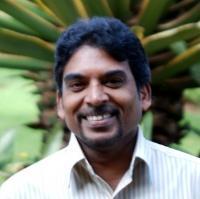 Padmakumar Varijakshapanicker has been working with the International Livestock Research Institute (ILRI) since 2009 and is currently managing the Asia hub of the Feed the Future Innovation Lab for Livestock System, an initiative of US Government implemented by University of Florida and ILRI. He is also the Acting Head of ILRI’s NIRS Feed Technology Platform at Patancheru, Hyderabad, India. Padmakumar is a post-graduate in Tropical Animal Production and Health and graduated from the Centre for Tropical Veterinary Medicine, University of Edinburgh, U.K. He has been working in the livestock sector for more than three decades and brings with him impressive research for development experience in developing countries including India, Nepal and Cambodia.
Padmakumar Varijakshapanicker has been working with the International Livestock Research Institute (ILRI) since 2009 and is currently managing the Asia hub of the Feed the Future Innovation Lab for Livestock System, an initiative of US Government implemented by University of Florida and ILRI. He is also the Acting Head of ILRI’s NIRS Feed Technology Platform at Patancheru, Hyderabad, India. Padmakumar is a post-graduate in Tropical Animal Production and Health and graduated from the Centre for Tropical Veterinary Medicine, University of Edinburgh, U.K. He has been working in the livestock sector for more than three decades and brings with him impressive research for development experience in developing countries including India, Nepal and Cambodia.
Feed the Future Innovation Lab for Livestock Systems is part of Feed the Future





